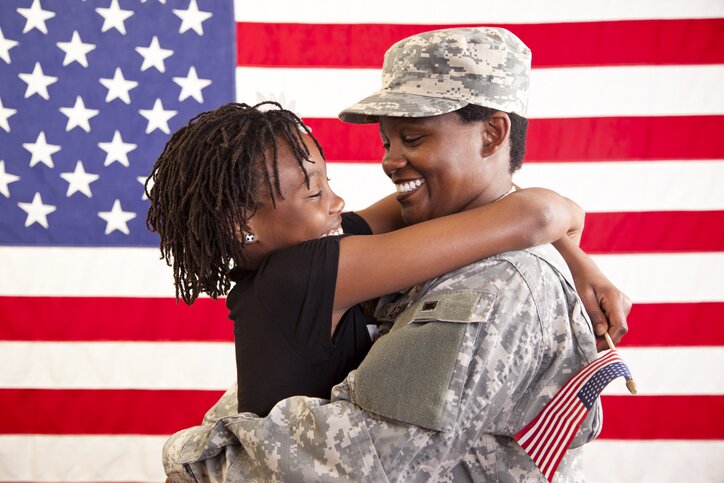Honoring Our Veterans On Independence Day & Beyond in Light of COVID 19
This month, we take the time to honor our Veterans and their heroic contribution to America, a free nation.
During the COVID-19 Pandemic, veterans have been hit hard with heightened health and economic threats. Some veterans have faced homelessness, lack of health care, and delays in receiving financial support. Over 10,000 and counting veterans have lost their lives from the pandemic. The mental and emotional challenges veterans face post-deployment make COVID-19-related stressors, such as isolation and emotional coping, extremely difficult. Other common challenges veterans face in the COVID-19 pandemic include interpersonal issues, such as changes with close family and friends, anxiety, PTSD, existential concerns, irritation and anger, depression, and suicidal ideation. Additionally, veterans have to manage to cope with physical injuries, sleep disturbances, substance misuse, readjusting to less structure, and risk-taking behaviors.
This July, let us honor those that have served in the military for all their hard work and the continued challenges they face and overcome. Here are four ways you can support a veteran during this time in the COVID-19 Pandemic:

1. Connect Them To Jobs
The U.S. Bureau of Labor Statistics (BLS) reported in April 2020 that more than 1 million veterans are out of work, with an unemployment rate of 11.7%. Some resources that can help veterans find jobs include AARP, which provides a job board and resumé support. Hire Heroes is another organization that helps veterans with interview and resume skills and training to support them in finding a post-military career. Additionally, The U.S. Department of Veterans Affairs (VA) offers assistance with online enrichment classes and job search support. Adjusting to civilian life after military service can be difficult, so supporting a veteran with finding consistent work and be fulfilling and help with positive mental health outcomes.
2. Look For Signs of Mental Health Issues & Reach Out
Veterans commonly face mental health issues during and after their service. Post-traumatic stress disorder (PTSD) is one of the veterans' most common mental illnesses. PTSD is a mental health condition triggered when someone experiences or witnesses a terrifying event. Symptoms can include flashbacks, nightmares, severe anxiety, and uncontrollable thoughts about the event. Symptoms of PTSD can also lead to other health issues, such as substance abuse or other self-destructive habits. For this reason, veterans and their families are encouraged to have open, honest conversations about post-traumatic stress and how to get help and support. For families with military service members, understanding the signs and symptoms of PTSD can create a strong foundation for continued communication.
3. Provide Extra Support and Recognition during Independence Day
Many people gear up for cookouts, friends, and fireworks during the Independence Day holiday. However, for veterans, Independence Day celebrations can trigger uneasiness and discomfort. According to Dr. Julie Usala, a clinical psychologist specializing in PTSD treatment at the Salem VA Medical Center in Virginia, recognizing triggers for vets ahead of time can help avoid bigger problems on Independence Day. For friends and family, pay attention. If you host a 4th of July picnic or gathering, ask guests ahead of time if they have difficulty around the holiday. Consider safe alternatives to loud fireworks, such as group sparklers. Additionally, consider reducing or opting to serve alcohol at 4th of July events.
4. A Thank You Goes A Long Way
A simple thank you can make an impact. If you know a veteran or see someone in a military uniform, a nice smile and those two words can go a long way. Being kind is not only refreshing to the receiver it also makes the giver feel good. Recognizing someone for our bravery and contributions allows us space to think outside of ourselves and connect with others in a meaningful way.
As we try to enjoy another COVID-19 summer, let’s not forget our veterans who the pandemic has significantly impacted. We must honor and celebrate their sacrifices in fighting to gain and keep our independence. Be patriotic this July and spend time connecting with a member of our United States military. Recognizing and giving back to those that serve is a great way to commemorate Independence Day this month!
About Vaughn Greene Funeral Services: For more than 25 years, Vaughn Greene Funeral Services has been providing a ministry of care to Baltimore’s African American community. As a leading local, minority- and family-owned provider, we promise to provide our highest level of service and respect to families who entrust us to honor their loved ones. For more information about our funeral, cremation, memorial, repast, and grief counseling services, please call us at 410.655.0015 or visit us online at https://vaughncgreene.com/.







Comments